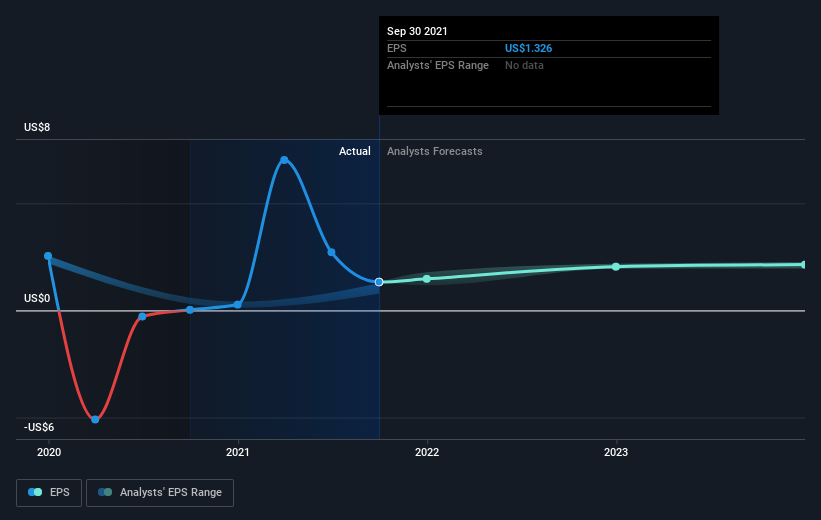PennyMac Mortgage Investment Trust's (NYSE:PMT) underlying earnings growth outpaced the favorable return generated for shareholders over the past year
There's no doubt that investing in the stock market is a truly brilliant way to build wealth. But if when you choose to buy stocks, some of them will be below average performers. Over the last year the PennyMac Mortgage Investment Trust (NYSE:PMT) share price is up 22%, but that's less than the broader market return. On the other hand, longer term shareholders have had a tougher run, with the stock falling 7.4% in three years.
While this past week has detracted from the company's one-year return, let's look at the recent trends of the underlying business and see if the gains have been in alignment.
Check out our latest analysis for PennyMac Mortgage Investment Trust
While the efficient markets hypothesis continues to be taught by some, it has been proven that markets are over-reactive dynamic systems, and investors are not always rational. One way to examine how market sentiment has changed over time is to look at the interaction between a company's share price and its earnings per share (EPS).
During the last year PennyMac Mortgage Investment Trust saw its earnings per share (EPS) increase strongly. We don't think the exact number is a good guide to the sustainable growth rate, but we do think this sort of increase is impressive. So we'd expect to see the share price higher. We're real advocates of letting inflection points like this guide our research as stock pickers.
You can see below how EPS has changed over time (discover the exact values by clicking on the image).
It's probably worth noting that the CEO is paid less than the median at similar sized companies. But while CEO remuneration is always worth checking, the really important question is whether the company can grow earnings going forward. Dive deeper into the earnings by checking this interactive graph of PennyMac Mortgage Investment Trust's earnings, revenue and cash flow.
What About Dividends?
As well as measuring the share price return, investors should also consider the total shareholder return (TSR). The TSR is a return calculation that accounts for the value of cash dividends (assuming that any dividend received was reinvested) and the calculated value of any discounted capital raisings and spin-offs. It's fair to say that the TSR gives a more complete picture for stocks that pay a dividend. As it happens, PennyMac Mortgage Investment Trust's TSR for the last 1 year was 34%, which exceeds the share price return mentioned earlier. The dividends paid by the company have thusly boosted the total shareholder return.
A Different Perspective
PennyMac Mortgage Investment Trust's TSR for the year was broadly in line with the market average, at 34%. That gain looks pretty satisfying, and it is even better than the five-year TSR of 14% per year. Even if the share price growth slows down from here, there's a good chance that this is business worth watching in the long term. It's always interesting to track share price performance over the longer term. But to understand PennyMac Mortgage Investment Trust better, we need to consider many other factors. To that end, you should learn about the 2 warning signs we've spotted with PennyMac Mortgage Investment Trust (including 1 which makes us a bit uncomfortable) .
If you would prefer to check out another company -- one with potentially superior financials -- then do not miss this free list of companies that have proven they can grow earnings.
Please note, the market returns quoted in this article reflect the market weighted average returns of stocks that currently trade on US exchanges.
This article by Simply Wall St is general in nature. We provide commentary based on historical data and analyst forecasts only using an unbiased methodology and our articles are not intended to be financial advice. It does not constitute a recommendation to buy or sell any stock, and does not take account of your objectives, or your financial situation. We aim to bring you long-term focused analysis driven by fundamental data. Note that our analysis may not factor in the latest price-sensitive company announcements or qualitative material. Simply Wall St has no position in any stocks mentioned.
Have feedback on this article? Concerned about the content? Get in touch with us directly. Alternatively, email editorial-team (at) simplywallst.com.

 Yahoo Finance
Yahoo Finance 
